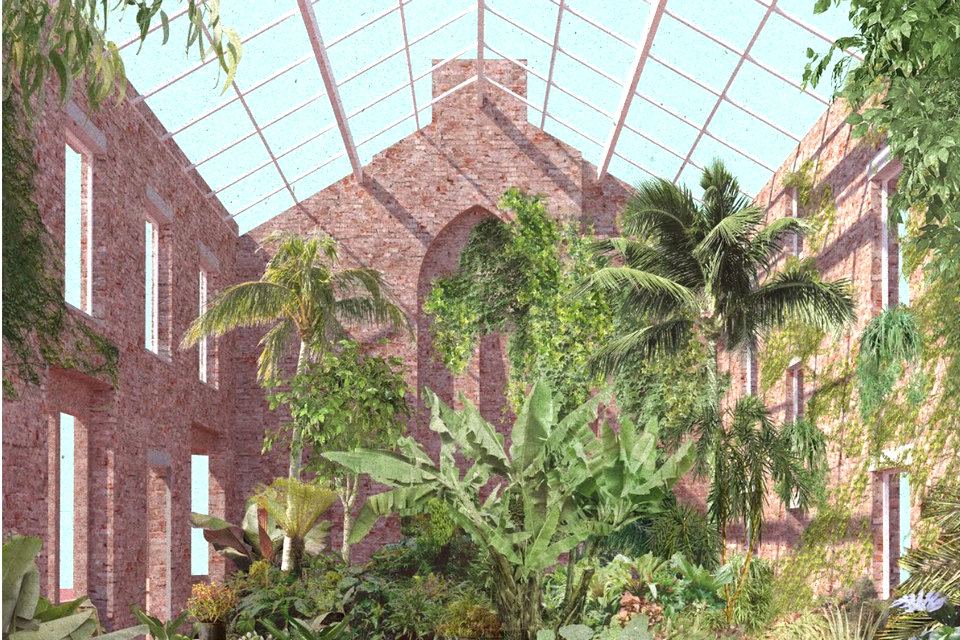The Winter Garden, a 360° micro documentary (Assemble Studios / Rob Vincent / Granby Four Streets). Shot and edited over three years, ‘The Winter Garden’ is a 360 film that celebrates the residents of Granby who, facing the demolition of their homes, fought back with creativity, a DIY spirit and a willingness to welcome and embrace others.
In the decades following the riots of 1981, the residents campaigned against the relocation of their community. In 2011 they formed a Community Land Trust and four years later joined forces with Assemble, the collective of artists and designers, to reimagine what their neighbourhood could look like. One plan that emerged from their collaboration – turning a derelict house into a Winter Garden and community centre – was central to Assemble winning a major UK art accolade: the Turner prize.
This film captures that transformation. The film places the audience inside the Winter Garden during key moments of its build. We see it in its derelict state, then much later when the trees are lifted in and finally when the space is being used as a workshop for local people. Punctuating these scenes are others that show the neighbourhood – a resident’s home, a hair and beauty salon and the local streets.
A key objective of the film was to convey the aspirations of the residents and make them the focus of the experience. The narrative is therefore delivered, owned and driven by the residents themselves who touch on their feelings about the past and, more importantly, voice their hopes for the future.
Rob Vincent, the producer, says ‘We hope that, when experiencing ‘The Winter Garden’, the audience will feel as if they are actually in Granby, in the midst of something extraordinary while hearing the innermost thoughts of the people who live there.’
Shot and edited over three years, ‘The Winter Garden’ is a 360 film that celebrates the residents of Granby who, facing the demolition of their homes, fought back with creativity, a DIY spirit and a willingness to welcome and embrace others.
In the decades following the riots of 1981, the residents campaigned against the relocation of their community. In 2011 they formed a Community Land Trust and four years later joined forces with Assemble, the collective of artists and designers, to reimagine what their neighbourhood could look like. One plan that emerged from their collaboration – turning a derelict house into a Winter Garden and community centre – was central to Assemble winning a major UK art accolade: the Turner prize.
This film captures that transformation. The film places the audience inside the Winter Garden during key moments of its build. We see it in its derelict state, then much later when the trees are lifted in and finally when the space is being used as a workshop for local people. Punctuating these scenes are others that show the neighbourhood – a resident’s home, a hair and beauty salon and the local streets.
A key objective of the film was to convey the aspirations of the residents and make them the focus of the experience. The narrative is therefore delivered, owned and driven by the residents themselves who touch on their feelings about the past and, more importantly, voice their hopes for the future.
Rob Vincent, the producer, says ‘We hope that, when experiencing ‘The Winter Garden’, the audience will feel as if they are actually in Granby, in the midst of something extraordinary while hearing the innermost thoughts of the people who live there.’
The Space, Birmingham
The Space is a unique commissioning and development programme to support greater digital access to the arts, founded and supported by the BBC and Arts Council England. Its purpose is to increase the audience reach and impact of publicly funded arts and culture through digital technologies, to build digital skills across the arts sector and to support the development and creation of innovative and interactive new art works.
The Space helps arts organisations innovate and form partnerships with emerging creative sectors to take arts forms into the future, encouraging artists and organisations to take advantage of the different artistic possibilities offered by digital media and technologies.
The organisation works to increase access to works that deserve to reach a bigger audience and that would be inaccessible for many people for reasons of cost, access, disability, and geography, as well as reaching new audiences who may not consume arts through traditional routes, including younger people, and those from more diverse backgrounds.
Supporting the UK arts sector through commissioning, content creation, audience development and distribution, and an extensive learning programme, Space projects reflect the diversity of talent, audiences, region and art form across UK arts and culture.
